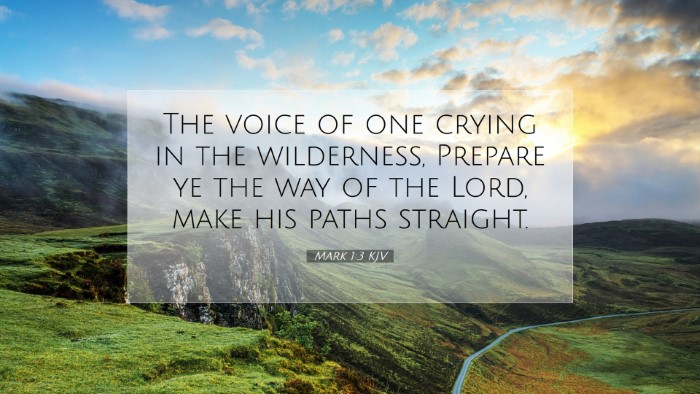Commentary on Mark 1:3
Verse Summary: Mark 1:3 states, "The voice of one crying in the wilderness, Prepare ye the way of the Lord, make his paths straight." This verse introduces John the Baptist's role in the prophetic tradition and the preparation for the coming of Jesus Christ.
Contextual Background
The Gospel of Mark begins with the declaration of the good news about Jesus Christ. The verse serves as a pivotal connection between the Old Testament prophecies and their New Testament fulfillment. John the Baptist fulfills the role of a forerunner, as prophesied in Isaiah (Isaiah 40:3).
Exegesis of Mark 1:3
In this segment, we will explore various dimensions of Mark 1:3 with insights drawn from respected public domain commentaries.
The Prophetic Voice
Matthew Henry: In his commentary, Henry notes the significance of John the Baptist’s role as a herald. He emphasizes that the term "voice" implies both authority and urgency. The wilderness symbolizes a place of separation and purification, where God often prepares His servants.
Albert Barnes: Barnes elucidates that John's call signifies the necessity of preparation for receiving Christ. This includes repentance and turning away from sin. He also points out that John’s message is not merely passive but an active call to amend one's life in anticipation of the Lord's arrival.
Adam Clarke: Clarke highlights the phrase "make his paths straight," indicating the moral and spiritual rectitude required to experience the blessings of the Lord. He suggests that this is a metaphor for removing obstacles in the heart that hinder the reception of divine truth.
The Wilderness Experience
The location of John's ministry—the wilderness—is significant in biblical theology. It is a place where God often reveals Himself and calls individuals to prepare His people.
- Matthew Henry: The wilderness often represents a time of spiritual dryness, yet it is here that God prepares individuals for His work.
- Albert Barnes: The harshness of the wilderness parallels the condition of the people who require repentance and renewal.
- Adam Clarke: The wilderness also signifies a departure from the corruption of society, indicating that divine work often occurs outside of established norms.
Theological Implications
This verse has profound theological implications, particularly regarding the nature of preparation and prophecy.
- Preparation for the Lord: It underlines the necessity of preparation in the life of believers as they receive Christ.
- Prophetic Fulfillment: John the Baptist encapsulates the prophetic tradition whereby the voice is essential for announcing God's work.
- Metaphor of Paths: The imagery of straight paths continues to resonate throughout Scripture as a call to ethical living and devotion.
Application for Today
The themes of Mark 1:3 are equally relevant in contemporary Christian life. The call to prepare a way for the Lord is a consistent challenge for believers.
- Personal Reflection: Christians are encouraged to reflect on their lives and remove barriers that hinder their relationship with God.
- Church Mission: The church collectively is urged to be a voice in the wilderness, proclaiming repentance and reconciliation.
- Hope and Anticipation: The message embodies hope, reminding believers that even in spiritual desolation, God is at work preparing His coming.
Conclusion
Mark 1:3 stands as a vital proclamation within the Gospel narrative. The combined insights of esteemed commentaries enrich our understanding of John the Baptist’s ministry and the overarching theme of preparation before the Lord's advent. Believers today are called to heed this message as a poignant reminder of their role in the story of redemption.


